
Skate or Die! is a skateboarding video game released by Electronic Arts (EA) in 1987 for the Commodore 64. It is EA's first internally developed game. Versions for the Apple IIGS, MS-DOS, Amstrad CPC, and ZX Spectrum followed. It was ported to the Nintendo Entertainment System by Konami, published under the company's Ultra Games branding.

Rob Hubbard is a British composer best known for his musical and programming work for microcomputers of the 1980s, such as the Commodore 64.

Paradroid is a Commodore 64 computer game written by Andrew Braybrook and published by Hewson Consultants in 1985. It is a shoot 'em up with puzzle elements and was critically praised at release. The objective is to clear a fleet of spaceships of hostile robots by destroying them or taking them over via a mini-game. It was later remade as Paradroid 90 for the Commodore Amiga and Atari ST home computers and as Paradroid 2000 for the Acorn Archimedes. There exist several fan-made remakes for modern PCs. In 2004 the Commodore 64 version was re-released as a built-in game on the C64 Direct-to-TV, and in 2008 for the Wii Virtual Console in Europe.
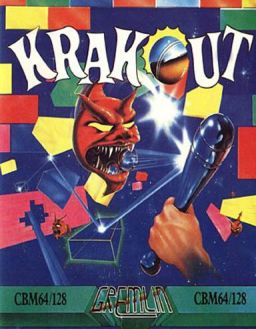
Krakout is a Breakout clone that was released for the ZX Spectrum, Amstrad CPC, BBC Micro, Commodore 64, Thomson computers and MSX platforms in 1987. One of the wave of enhanced Breakout variants to emerge in the wake of Arkanoid, its key distinctions are that gameplay is horizontal in layout, and that it allows the player to select the acceleration characteristics of the bat before playing. It was written by Andy Green and Rob Toone and published by Gremlin Graphics. The music was composed by Ben Daglish.
Thalamus Ltd was a British computer game developer that published titles for a number of 8-bit and 16-bit platforms during the late 1980s and early 1990s.
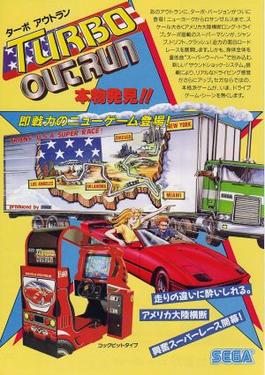
Turbo OutRun (ターボアウトラン) is a 1989 arcade racing game released by Sega. A follow-up to 1986's Out Run, it was released as a dedicated game, as well as an upgrade kit for the original Out Run board.

Uridium is a science fiction side-scrolling shoot 'em up originally designed by Andrew Braybrook for the Commodore 64, and later ported to other 8-bit machines. It consists of fifteen levels, each named after a metal element, with the last level being called Uridium. The manual quotes Robert Orchard, who invented the name as saying "I really thought it existed".

Shoot-'Em-Up Construction Kit is a game creation system for the Commodore 64, Amiga and Atari ST created by Sensible Software and published by Outlaw in 1987. It allows the user to make simple shoot 'em ups by drawing sprites and backgrounds and editing attack patterns. The advertising promoted the Kit with the phrase "By the programmers of Wizball and Parallax".
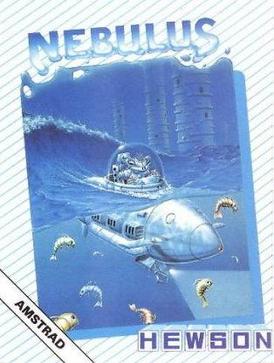
Nebulus is a platform game created by John M. Phillips and published by Hewson Consultants in the late 1980s for home computer systems. International releases and ports were known by various other names: Castelian, Kyorochan Land, Subline, and Tower Toppler.

Winter Games is a sports video game developed by Epyx, based on sports featured in the Winter Olympic Games.
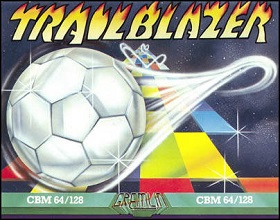
Trailblazer is a racing video game developed by Mr. Chip Software and published by Gremlin Graphics for the ZX Spectrum, Commodore 64, Atari 8-bit computers, Amstrad CPC, Commodore 16 and Plus/4 in 1986. It was ported to the Amiga and Atari ST.
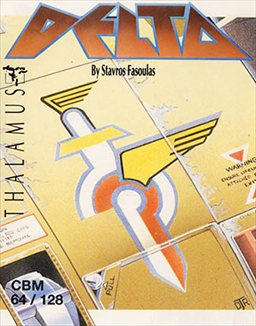
Delta is a horizontally scrolling shooter released for the Commodore 64 by Thalamus Ltd in 1987. It was programmed by Stavros Fasoulas and the music was written by Rob Hubbard. The game was published as Delta Patrol in the United States by Electronic Arts, for its Amazing Software action game line, in 1987 on the Commodore 64. It was also released for the ZX Spectrum in 1990 as Delta Charge.
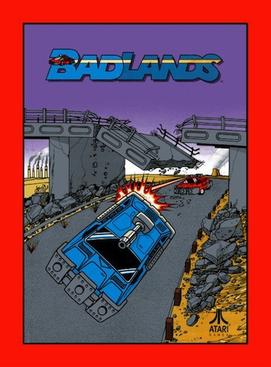
Badlands is a 1989 arcade video game published by Atari Games. It was ported by Domark under the Tengen label to the Amiga, Amstrad CPC, Atari ST, Commodore 64, and ZX Spectrum. The game is a re-themed version of Atari's previous racing games Super Sprint and Championship Sprint with the addition of vehicular combat. Badlands is set in the aftermath of a nuclear war and races around abandoned wastelands with many hazards. Three gun-equipped cars race around a track to win prizes.
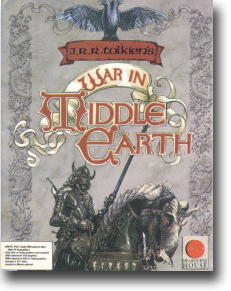
War in Middle Earth is a real-time strategy game released for the ZX Spectrum, MSX, Commodore 64, Amstrad CPC, MS-DOS, Amiga, Apple IIGS, and Atari ST in 1988 by Virgin Mastertronic on the Melbourne House label.

Silkworm is a horizontally scrolling shooter developed by Tecmo and first released for arcades in 1988. In 1989 it was ported to the Amiga, Atari ST, Commodore 64, ZX Spectrum, Amstrad CPC and NES (1990) systems by The Sales Curve and released by Virgin Mastertronic.

World Tour Golf is a 1986 video game by Evan and Nicky Robinson, Paul Reiche III and published by Electronic Arts for Commodore 64, Amiga, Apple IIGS, and DOS.
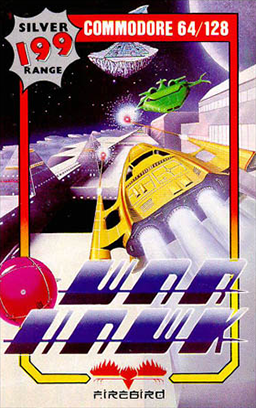
Warhawk is a vertically scrolling shooter published in 1986 by Firebird software. It was released for the Commodore 64, Atari 8-bit computers, Amstrad CPC, and Atari ST.

GBA Championship Basketball: Two-on-Two is a sports video game for IBM PC compatibles Amiga, Apple II, Apple IIGS, Amstrad CPC, Atari ST, ZX Spectrum, and Commodore 64. It was developed by Dynamix and published in 1986 by Activision.

The Real Ghostbusters is a 1987 shoot 'em up arcade game developed and published by Data East. It is loosely based on Ghostbusters. In Japan, Data East released it as a non-Ghostbusters arcade game under the title Meikyuu Hunter G. In 1989, Activision published The Real Ghostbusters for Amiga, Amstrad CPC, Atari ST, Commodore 64, and ZX Spectrum.

Judge Dredd is a 1991 platform shoot 'em up video game based on the character of the same name. It was developed by Random Access and published by Virgin Mastertronic. It was released in Europe in 1991, for the Amiga, Atari ST, Commodore 64, and ZX Spectrum. Critics found the gameplay repetitive.



















